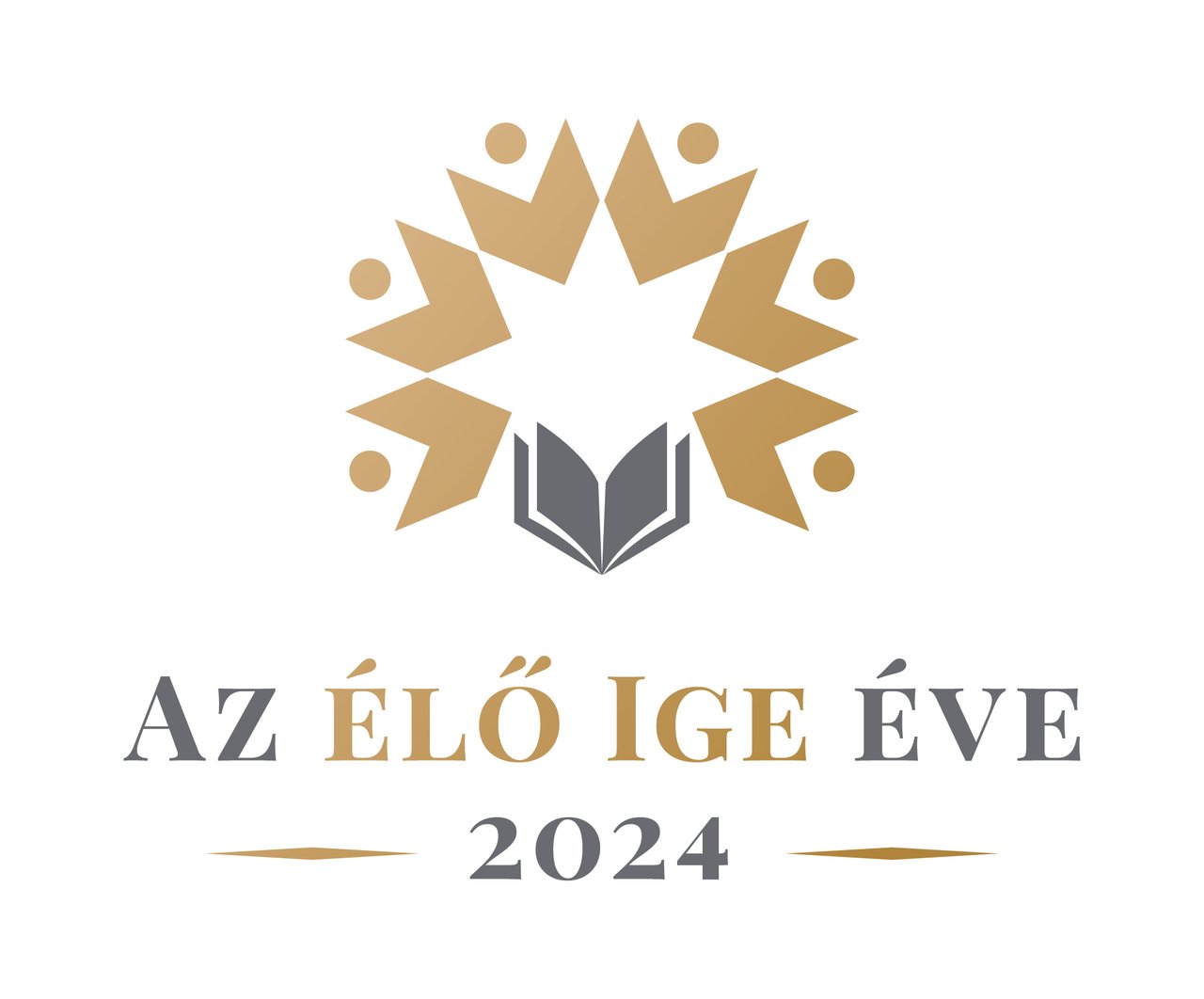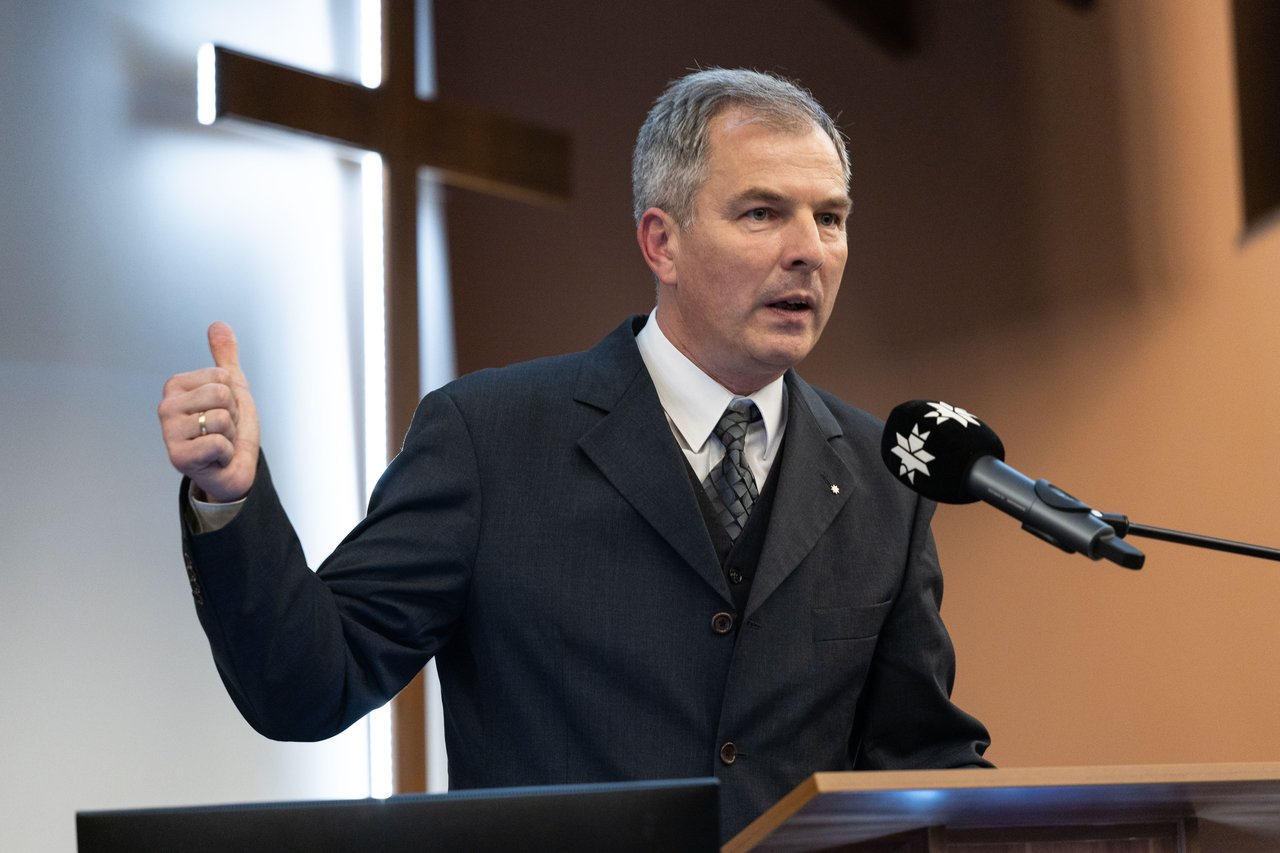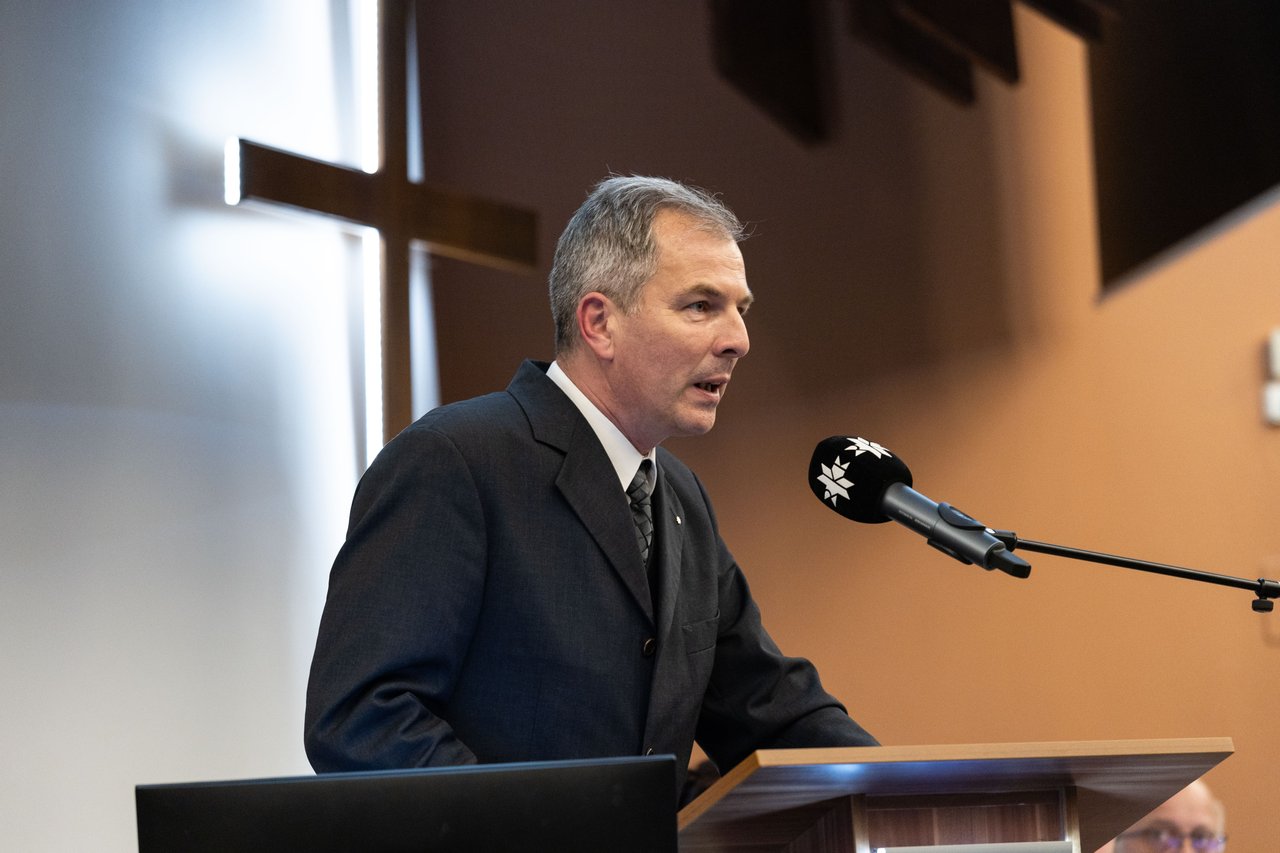God created the world and the church by his word. Groups of believers, clinging to Christian grace, belong by faith to God's covenant. Local churches are nourished by the living Word of God. Our communities have an intrinsic value beyond themselves in proclaiming the Gospel that moves and brings about profound change in those who listen.
The Reformed Church in Hungary has declared 2024 the Year of the Living Word, which is closely linked to the Year of the Pastoral Profession, proclaimed in 2023. The leadership of the church entrusted the preparation and elaboration of the necessary background material, the formulation of the theological basis, and the implementation of the programme to the Mission Service of the Reformed Church of Hungary, headed by Pastor Levente Zoltán Hajdú, Director General of the Service.

What gave you the idea for the Year of the Living Word?
The idea was already formulated in the summer of 2023 at the meeting of the Presidential Council of the Reformed Church of Hungary (RCH) in Sárospatak, and the decision was made to start the preparatory work. Within and outside the Church, we all experience that in our time, people are hungry for spiritual guidance and leadership and try to find solutions in the most impossible places, almost as a substitute action. Now, we have been given a unique opportunity by God: in our fragmented, polarised world, the Reformed Church of Hungary can convey a tangible, real, and constructive message, which can have a restorative power at both the individual and community level. I am convinced that there is no other or better instrument for healing our vegetating society than the Gospel of Christ. The Word of God is not a theoretical truth. It can bring It can bring life to the stagnation within and among us. The term living Word comes from the personal and communal experience of being renewed and made dynamic by the Word of God. But what, or rather who, is The Word? We read about it most explicitly at the very beginning of John's Gospel: 'The Word made flesh.' The apostle speaks of God incarnated. God's reality in action is an amazing miracle. He wanted to be present in the world in such a way that man could experience spiritual things despite his limited receptive faculties. So the God among us, Jesus Christ, is The Word. Beyond his earthly existence, his person is man's relationship with God, who animates him. The revelation that we receive from and through him brings salvation to a world of men that is doomed to death, doomed to perdition without him. The living Word beams life on.
This transmission presupposes that the living Word does not stop at the boundaries of the Church.
We are not just thinking about the internal dynamics or revival of the church. We take seriously the Great Commission of Jesus in the twenty-eighth chapter of Matthew's Gospel: "Go therefore and make disciples of all nations..." To find the bridges between the man who is seeking God today and the church that proclaims God's message. We have set three objectives for the Year of the Living Word: to show, to help, and to move. Each of these objectives is inspired by the dynamic expressed in the title of the thematic year. The living Word is vital. Hence, all three concepts - to show, to help, to move - suggest that the Church should dare to step outside the walls of comfort zones that often seem familiar only because they are known, but which have often been surpassed by the times.
I do not mean modernisation. The Word of God can be dynamic if it speaks to the people of today in a way that is understandable and relevant to their lives. The channels for this must also be found within the church. I believe that God wants to do something with today's Hungarian society, with us. He has not given up on us. We are not fighting a rearguard action; Christianity is not in a defensive closing period but wants to convey a living, comprehensible message to the people of today. It is able to lead us to the realisation that it is about me, that it is addressed to me, and that it wants to start something new with me, with my life, and that it wants to do so in a way that also connects us with others, that is, that creates community, communities.

Zoltán Levente Hajdú, minister and head of RCH's Mission Service
What impact will all this have on the church and outsiders?
Within the Church, the Year of the Living Word aims to awaken and bring to life the congregations and the whole Church, to strengthen and constantly renew them. So we want to work through the congregations, the communities that are the lifeblood of the Church. To set in motion processes that enable us to act in the transmission of life. We are not planning one-off events with firework effects, feeding from nowhere, leading nowhere. God created us for community and connection. We want to belong and experience a sense of "being home." Attractive, welcoming, home-like communities are where God's creative power is at work. We don't organise new programmes; we want to fill those existing with content. It would be a fool's errand to add new programmes to the already busy calendar of today's people.
Our plan is that the Year of the Living Word will build up the local church by integrating our themes and content - both in spirit and in action. In society, we are looking for the points of contact where we can include in the Church's bloodstream those who live around us, who are not churchgoing but open to spirituality, as the census shows. The bridge-builders of culture, science, and art will be a link. I am thinking of people who are value bearers, value transmitters, and open to Christianity. We can engage them and start a dialogue with them if we start talking about their field and their art. In this way, we can build a bridge that can connect the secularised with the message of the living Word. It is interesting that this concept of a bridge was already mentioned in Sárospatak, at that particular Presidium Council meeting, as an important element of the thematic year. All this requires openness, openness on both sides.
The year of the pastoral vocation has come to a close. How will support for our pastors continue next year?
Imagine the process as concentric circles. The outer part is the front line, where the watchmen, the pastors, work. Their support, their strengthening, and their physical and spiritual maintenance will continue as it started in 2023. This year, the Church started the changes by thinking in terms of building large and secure systems, meaning that structures and networks that had been missing for decades began to operate. Just think of the year-long preparation of the internet/intranet network to support administration, management, and internal communication from January, or the Gyökössy Institute. Both have been unfulfilled dreams for years. There is an explosive demand for the newly announced spiritual-mental support. We have already had to multiply the programmes and accompaniment announced because it is not enough.
We are not taking our eyes off the pastors; in fact, we want to strengthen them for the first time in 2024, now through the congregations. There is a poignant Scripture in the twenty-sixth chapter of the Gospel of Matthew: "I will strike the shepherd, and the sheep of the flock will be scattered." Strengthening the shepherd is the first step in maintaining the flock. Our thematic years build on each other logically.
KEY EVENTS OF THE YEAR OF THE LIVING WORD:
27 January 2024 - Meeting of pastors from Hungary and the Hungarian community in Slovakia (Groupama Arena)
24-25 May 2024 - the Day of Reformed Unity (Debrecen)
October 2024 (tbd) - the Day of the Living Word (at the Ráday House in Budapest, with the participation of András Visky, writer, dramaturg, professor of Károli University, patron of the year)
Caring for young people is not an optional task, but an integral part of the Church's vocation and historic mission. Their presence can help to rejuvenate the image of the Church. How can the Year of the Living Word be a partner for our communities?
Despite regional differences, it is clear that globalisation processes are impacting young people worldwide, whose social and cultural engagement has changed significantly at national and international levels, within and outside the Church. Moreover, these processes have accelerated. Generally speaking, there is a growing demand for freedom, autonomy, and expression, especially through social media. The need for change is imperative in dealing with young people. If we do not speak in a way that they understand, if the way the Church works is not one that they can experience as home, they will develop the sad image that the Church is a relic of the past. But it is through the questions of young people and the answers to them that the Church can move forward, step by step, in the process of renewal. The experience of faith and communion helps them face the great challenges of life and find their place in society and the ecclesial community in a responsible way.
We, as good and careful biblical hosts, must keep the new in mind while preserving all the precious traditions so that we can present to them the eternal Gospel, which is never changing in its message and which always wants to be present in society in a timely way. We will accompany young people in managing this cultural change during the Year of the Living Word, and they and children will, therefore, have a special role. In many congregations there are many signs of faithful, spiritual vitality. There are large numbers of youth and fragments alike. We want to bring these together into larger units, and we are working closely with the Youth Department of the Synod Office of RCH to help congregations and bring together congregations to make an impact in this area.
How will you communicate? What kind of content will be available in the digital media?
We provide funding opportunities for national, diocesan, church organisation, and congregational level programmes, as well as guidance to help you with the application process. On the one hand, we focus on the diocesan level to link individual congregations and, on the other hand, on organisations and their events, with a particular emphasis on the programmes offered by youth organisations for young people. Documents will be available that are specifically designed to take the burden off those who serve and contribute to the renewal of personal faith life. Key events will be promoted, organised, and reported on through the Reformed media. The event is not just the event itself, there is a before and after. We need to pay attention to these, too, to see how the message reaches the people we are addressing, how it is delivered, and what impact it has on the functioning of the congregations afterwards. There will also be a collection of specially produced scientific background documents and conference materials. Theoretical, informative, and practical - these will be the three keywords for our media interfaces. We will also launch a Facebook and Instagram page.

What are the areas with which you work closely?
Organising the Year of the Living Word belongs is the responsibility of the RCH Mission Service. Still, we must not forget that it is really for the whole Church. We are working together with everyone because it will only fulfil our hopes for it if it is something we work for but also something that the members of the congregation and the pastors take to heart. Our objective is to ensure that no area is left out. For example, we are looking for cooperation with our charity, educational and social institutions. But our target community is, above all and fundamentally, our congregations. It is our experience that those who become active members of the local community in the long term are those who are involved in its functioning. The mission of the Year of the Living Word is to build community, appreciate and pass on the values we have recognised. We want to move away from an individualistic approach. My direct colleagues are Rev. Bendegúz I. Kovách, who coordinates and leads the organisation and operation of the thematic year, Rev. Dóra Császár-Harangozó, the communication officer of the Mission Service of RCH, and Rev. Anikó Právetz, who supports the work with her operational activities.
After twenty-five years of pastoral ministry, what do you expect from the Year of the Living Word?
Since being called by God to pastor, I have seen him change lives, build communities, and create miracles out of almost nothing. I can start this year with the same faith that God can do that. He has the power to strengthen churches that have lost hope and to restore communities that doubt their future. Even more than that, I expect him to work through us to renew Hungarian society despite our fragmentation. This is what motivates me. Because I know that God is all-powerful. Therefore, I will not settle for less. I believe that we can be part of miracles in 2024.
Mission Statement of the Mission Service of RCH
The message of the Lord Jesus, our Saviour, strengthens and encourages us, his contemporary disciples, in our confession: “… for it will not be you speaking, but the Spirit of your Father speaking through you.” (Mt 10:20) What we want to proclaim through his Spirit to the people, today, is nothing else but the Gospel of life. We want to convey the message that there is no area, no aspect, no moment of human existence where the love of the Almighty God, granting life in its fullness, couldn’t be experienced.
The task of the Mission Service of the Reformed Church in Hungary is to proclaim God's love to our congregations and institutions, and even beyond, to the whole of society - not just by words, but in practical deeds and through active witness of life, in a confessing community of believers. Because God wants to be present in the lives of the people of our days! We do this order that more and more people may realise that God has prepared for them peace, security, and a new and joyful life perspective, with the personal love of which the prophet confesses: “...with everlasting kindness I will have compassion on you, says the Lord your Redeemer" (Isa 54:8).
In all our ministry, we want to witness to the redeeming Lord, bringing people closer to him through faith and love!
Shaping an Audience into a Community
“To my mind, the church lives in congregations that perform their ministry with conscious and committed faith – not only within the community, but also when it comes to the outside world, to society.” Interview with the new head of Mission of RCH.